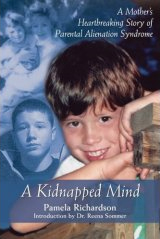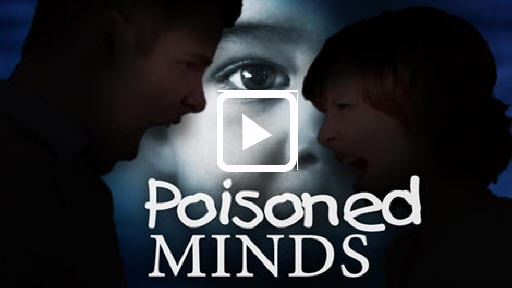JOURNAL OF PSYCHOSOCIAL NURSING 1994, Vol. 32, No. 11 p 9-12
Parental Alienation Syndrome
A Developmental Analysis of a Vulnerable Population
By Joseph L. Price, Ph.D. and Kerry S. Pioske, RN, MS, ANP
The American family is changing, and divorce is no small part of the pattern. In the United States, there are nearly a million and a half divorces and annulments annually. It is estimated that 40% to 50% of adults will eventually divorce . Including (Bee, 1992) the indirect effects on family and friends, the impact of divorce has ripple effects not only for those directly involved, but also for society and clinical nursing.
Many children involved in divorce and custody litigation undergo thought reform or mild brainwashing by their parents. This disturbing fact is a product of the nature of divorce and the disintegration of the spousal relationship in our culture. Inevitably, children receive subtly transmitted messages that both parents have serious criticisms of each other.
Parental alienation syndrome, however, is much more serious. It involves the systematic vilification by one parent of the other parent and brainwashing of the child, with the intent of alienating the child from the other parent (Gardner, 1982). This article explores parental alienation syndrome from the perspective of parental adult developmental needs. The effect of divorce on the family system and implications for nursing also are examined. Using pseudonyms, two case studies exemplify the lived experience of parental alienation syndrome.
CASE STUDIES
Billy
Mrs. M., 30, and her 4-year-old child, Billy, were seen in the community health care clinic for routine physical examinations. During the course of the examination, the nurse noted that Mrs. M. was constantly reprimanding Billy, disallowing him to explore the office.
A derogatory statement was made by Mrs. M. that Billy is going to be "just like his father." The nurse inquired as to Mr. M.'s well-being. Mrs. M. related details of the recent divorce and custody litigation, and added that she would do all she could to ensure that Mr. M. never gained custody of Billy. The nurse asked Billy about his relationship with his father. Billy, in adult language, stated, "Daddy is an alcoholic and a womanizer and doesn't deserve to have children. I hate him, and I never want to see him again."
Sheila
On a Sunday night, Sheila, an 18 month-old female infant, was brought to the emergency room by her distraught mother, Mrs. L., who stated that Sheila had been sexually abused by her father. Mrs. L. related that Mr. L. had visiting rights with Sheila that weekend, and when he returned Sheila she had a "red bottom." The child abuse clinical team was called to evaluate Sheila. Sheila had an intact hymen on examination, and no physical evidence of sexual abuse was present. When the police investigator interviewed Mr. L., he stated that he was so afraid of Mrs. L.'s accusations that he was reluctant to change Sheila's diapers while she was visiting.
IDENTIFICATION OF PARENTAL ALIENATION SYNDROME
These two case studies illustrate parental alienation syndrome, which manifests in behavior of both children and parents. Gardner (1982) asserted that "children who describe one parent as having all assets and no liabilities and the other parent as being the incarnation of all of mankind's evils" may have been excessively programmed. Because of the preferred parent's excessive denigration, the children will use adult language in describing the other parent_as though according to a script as seen in the nurse's interaction with Billy.
"Child sexual abuse after divorce is rare."
Parental alienation syndrome occurs when one parent is engaged in an attempt not merely to destroy the other parent, but also to make the child join in the process. The child becomes "a weapon, a spokesperson, and a co-combatant" (Johnston, 1987). Gardner (1982) described the process well:
The preferred parent exacts as the cost of his/her love the destruction of the child's empathy and identification with the other parent, forcing the child into open but ambivalent conflict with that parent. The emotional relationship with one parent is totally ruptured and the child's developmental needs are ignored.
It is from this description of the process of parental alienation syndrome that the nucleus of the problem becomes clear. The adult developmental needs and losses of the thought-reforming patent overwhelm and take control of the situation, causing unintended neglect of the child's needs and losses. All too often, the inability of the adult to deal with loss in the face of normal developmental needs and adult growth provokes depression, anger, and aggression.
ALLEGATIONS OF CHILD SEXUAL ABUSE
Some clinical studies have reported a significant incidence of child sexual abuse in families after marital dissolution (Thoennes, 1990). There may be several reasons for this outcome, including stress-related psychosocial problems, aggressive acting-out caused by loss, and increased opportunities for abuse.
In the face of these reports, however Thoennes and Tjaden (1990) found in their own research that child sexual abuse after divorce is rare. According to Myers (1990), allegations of sexual abuse occur in 2% to 4% of divorces. Of these allegations, 8% to 20% probably were false and occurred during custody disputes. There tends to be a high percentage of fabricated reports when divorced couples experience animosity, as was illustrated in the case of Sheila. Although potentially unfounded allegations of child sexual abuse must be taken seriously they also may be one indicator of parental alienation syndrome.
ADULT DEVELOPMENTAL NEEDS
Adult developmental theory illuminates the dynamic issues that confront parents and lends understanding to the genesis of parental alienation syndrome. Bee's (1992) and Vaillant's (1977) central thesis is that "for an adult to be able to cope effectively with the slings and arrows of normal life, one's defense mechanisms must be mature." Vaillant proposed a developmental dimension to defense mechanisms and contended that some defense mechanisms are Read More ..ture than others. During stressful life events adults may regress to less mature defense mechanisms, including distortion, passive-aggressive behavior, displacement, re action-formation, and acting-out. People vary in their levels of maturity; that spousal maturity is vital to coping successfully with divorce.
Loevinger's (1976) theory of ego development offers another possible developmental stimulus for parental alienation syndrome. A person stuck in the "self-protective stage" is learning self- control of impulses by anticipating short-term rewards or punishment. The person understands the existence of rules but tries to maximize his or her own gain. It is logical that various actions taken by spouses enmeshed in divorce provide some sort of short-term pleasure in the punishment of the other spouse.
Erikson's (1950, 1959, 1986) theory of identity development also brings perspective to the psychosocial development of parental alienation syndrome (Evans, 1969). Historically, more divorces occur during the developmental period when spouses are resolving Erikson's stage of intimacy versus isolation. At this developmental period, adults work to master intimate relationships or risk suffering isolation. Divorce severs intimate relationships and can cause isolation for both spouses.
Because unresolved conflicts within one developmental stage are carried forward to the next, adults frequently face difficulty resolving tasks in successive stages. If divorced persons are unable to experience intimacy, personal identity is at risk for remaining indistinct, causing a continuing search for this absent dimension of adult life. The clinical lesson here is that the developmental needs of adults may take priority over the needs of the child.
LOSS, DEPRESSION, ANGER, AND AGGRESSION
Attachment can easily underlie a grieving process, ultimately leading to depression. The degree and nature of the attachment determines the extent of depressive reactions to loss (Drake, 1975). Next to the death of a loved one, divorce is one of the more stressful events facing adults, and leaves way for a profound experience of loss and, therefore, emotional depression.
Entering parenthood predisposed to reactive depression renders one emotionally vulnerable when confronted with the lass and feelings of helplessness so typically associated with divorce. Anger and aggression quickly follow to adapt to the profound sense of hopelessness of the situation. These dynamics frequently result in destructive externalization of feelings and cause guilt, which aggravates the helplessness.
Encourage divorcing parents to refrain from open hostility and criticism.
The parent experiencing divorce is grieving a significant loss: loss of intimacy, loss of economic stability, and the loss of past and future attachments. Isolation, compounded by a depressed mood and dependent state, poor self-concept and reliance on external values, can lead to depression. The pileup of losses exacerbates feelings of helplessness, which convert to anger, aggression, and destructive externalization. By manipulating the child's feelings, alienation of the other parent creates the illusion of increasing the depressed parent's sense of control, and decreasing feelings of helplessness. Parental alienation syndrome may manifest as anger and hostility toward the other parent, but beneath the surface depression and dependency thrive.
EFFECTS ON THE FAMILY
Family, the basic unit of society, is best viewed as an open system made up of subsystems and part of a super-system (Wright, 1994). The family whole is greater than the sum of its parts; therefore, a change in one subsystem creates issues of balance between change and stability, ultimately affecting the whole.
In an era in which the traditional nuclear family is no longer the norm, it is essential that the nurse become aware of the multiple problems facing today's family. Given the current norm of serial marriage and blended families, nurses encounter More family-centered issues in primary health care than ever before. Family development occurs in stages that correspond to the concurrent developmental phases of its members, and because divorce may occur at any stage in the family life cycle, its impact will vary (Wright, 1994). Parental alienation syndrome disrupts the morphogenetic potential of the family and is detrimental to the health and development of the parent-child relationship.
An alteration of family composition is what divorce is all about. Alteration in composition within the family system also is seen as a loss that must find adaptation. All members of the family are affected by the loss, including the parent who left the family system. Boundaries within the family shift, and subsystems within the family are altered (Wright, 1994). The family system changes with this loss, and so the stability and integrity of the family system is threatened during the divorce process.
As stated previously, parental alienation syndrome is a symptom of depression and dependency and affects the functioning of the family. Johnston and associates (1987) found that children who were the object of custody and access disputes also tended to be depressed, withdrawn, uncommunicative, and to suffer somatic complaints. This, too, is representative of the impact of parents on individual family members.
IMPLICATIONS FOR CARE
Nurses who diagnose parental alienation syndrome in clinical practice have both individuals and a family in need of care. The case examples illustrate unhealthy situations in which the nurse can intervene for the health of the parent-child relationship and the health of the family system. Prevention is the best policy (Berkey, 1991). For families undergoing the stress of divorce, the nurse must play the roles of educator and family counselor, as well as design a triage for more in-depth family therapy referral. For the family experiencing parental alienation syndrome, family therapy, along with several other nursing interventions, is appropriate.
Key Points
Parental Alienation Syndrome
-
Parental alienation syndrome is the systematic denigration by one parent of the other parent with the intent of alienating the child.
-
Parents who engage in alienating activity have experienced loss, leading to depression. anger, and aggression. The family system, experiences loss during divorce and is adversely affected by the alienating activities of one parent.
-
Understanding the dynamics of parental alienation will position the nurse to recognize it as a symptom of depression and dependence, and bring care to the vulnerable population.
Parental Alienation Syndrome: A Developmental Analysis of a Vulnerable Population.
Price, J.L., Pioske, K.S. Journal of Psychosocial Nursing and Mental Health Services 1994; 32(11):9-12.
Promulgating a strict policy of not criticizing parents in the presence of the children is a critically important first step. The nurse can encourage divorcing parents to refrain from open hostility and criticism (Ahrons, 1987). Respect and admiration for both parents is important for the child's healthy emotional development. Parents can learn to give an accurate picture of the other parent's "assets and liabilities," and to answer the child's questions in simple language with "honesty tempered by discretion ... and refrain from being brutally honest" (Wilner, 1985). Refraining from criticism has the secondary effect of short-circuiting the cycle of anger and guilt.
Seriously upset parents may not be able to understand the child's developmental needs; therefore, the nurse serves as a guide through the child's evolution of growth. Helping parents to answer the child's questions with statements that are age appropriate and emotional-maturity appropriate is essential (Wilner, 1985; Wright, 1994).
Nurses can reflect parental feelings and actions in understandable terms. By appreciating the normal process of grieving and loss, parents will understand that their feelings are not "abnormal," and will come to recognize anticipated stages of healing.
Children need attention from each parent. Helping parents to understand that visitation promises must be kept and encouraged by the custodial parent is another nursing imperative. Visitation privileges give the custodial parent the opportunity to develop a "personal social system" that facilitates helping children deal with the stress of divorce and single parenthood (Wright, 1994). The nurse can encourage the parents to invite a friend to attend home visits and assist the natural growth of a support system (Wright, 1994). Nurses also can promote the formation of and participation in parental support groups within the community.
Lastly, nurses are able to provide a supportive environment in which the parent has a chance to verbalize frustration, hostilities and anger, as well as depression and guilt. Encouraging parents to constructively externalize negative feelings promotes a healthy opportunity for emotional resolution.
At a time when divorce is a prominent issue of family living, nurses must be aware of parental alienation syndrome to prevent its detrimental effects on individuals and families. Parents are less sensitive to that child's emotional needs during divorce, and require assistance from the nurse to strengthen the parent-child relationship and support them in their grief. Understanding the dynamics of parental alienation syndrome will position the nurse to recognize it as a symptom of depression and dependence, and bring care to a vulnerable population.
REFERENCES
Ahrons, C.R., Rodgers, R.H.Divorced Families: A multidisciplinary developmental approach. New York: W.W. Norton, 1987.
Bee, H.L.The journey of adulthood. New York: Macmillan, 1992.
Berkey, K.M., Hanson. S.M.H.Pocket Guide to family assessment and intervention. St. Louis: Mosby 1991.
Drake, R.E., Price, J.L. Depression: Adaptation to disruption and loss. Perspectives in Psychiatric Care 1975: 13(4): 163-169.
Erickson, E.H.Childhood and society. New York, Norton. 1950.
Erickson. E.H.Identity and the life cycle. New York: International Universities, 1959.
Erickson, E.H., Erickson, J.M., Kivnick, H.Q.Vital involvement in old age. New York: W.W. Norton, 1986.
Evans, R.I.Dialogue with Erik Erikson. New York: Dutton. 1969.
Gardner, R.A.Family evaluations in child custody litigation. Creative Therapeutics. 1982
Johnston, J.R., Gonzalez, R., Campbell, L.E.G. Ongoing postdivorce conflict and child disturbance. J Abnorm Child Psychol 1987 15(4):493-509.
Loevinger, J.Ego development. San Francisco. Jossey-Bass, 1976.
Myers, J.E.B. Allegation of child sexual abuse in custody and litigation: Recommendations for improved fact finding and child protection. Journal of Family Law 1990; 28(1):1-28.
Thoennes, N., Tjaden, P.G. The extent, nature and validity of sexual abuse allegations in custody/visitation disputes. Child Abuse & Neglect 1990; 14:151-163.
Vaillant, G.E.Adaptation to life: How the best and brightest come of age. Boston: Linde Brown, 1977.
Wilner, M.S. After divorce: Meeting the children's needs. Medical Aspects of Human Sexuality 1985; 19(3):25-31.
Wright, L.M., Lealley, M.Nurses and families: a guide to family assessment and intervention. Philadelphia: F. A. Davis, 1994.
Joseph L Price. PhD, is Director. University Health Center and Professor, School of Nursing. The University of Portland, Oregon; Kerry S Pioske, RN, MS, ANP is Nurse Practioner University Health Center, The University of Portland, Oregon.
Address correspondence to Joseph L. Price, PhD, Professor. School of Nursing, Director University Health Center, The University of Portland. 5000 N Williamette Boulevard, Portaland, OR 97203-5798

TV Show about Parental Alienation
W5 investigates: Children on the frontlines of divorce
November 7, 2009
The world of divorce is scary for any child. But when a divorce becomes especially toxic, children can become the target of an unrelenting crusade by one parent to destroy the child's relationship with the other. Experts call it parental alienation.

A Kidnapped Mind
What does Parental Alienation Syndrome mean? In my case, it meant losing a child. When Dash was 4 1/2 years old his father and I broke up. I dealt with the death of our marriage and moved on but Peter stayed angry, eventually turning it toward his own house, teaching our son, day by day, bit by bit, to reject me. Parental Alienation Syndrome typically means one parent's pathological hatred, the other's passivity and a child used as a weapon of war. When Dash's wonderful raw materials were taken and shaken and melted down, he was recast as a foot soldier in a war against me.
Divorced Parents Move, and Custody Gets Trickier
The New York Times, New York city, U.S.A. August 8, 2004
Not too long ago, Jacqueline Scott Sheid was a pretty typical Upper East Side mother. Divorced and with a young daughter, she had quickly remarried, borne a son, and interrupted her career to stay home with the children while her husband, Xavier Sheid, worked on Wall Street.
Early last year, Mr. Sheid lost his job and saw his only career opportunity in California. But Ms. Sheid's ex-husband, who shares joint legal custody of their daughter, refused to allow the girl to move away. So Ms. Sheid has spent much of the last year using JetBlue to shuttle between her son and husband on the West Coast and her daughter (and ex) on the East.
The New York court system, which she hoped would help her family to resolve the problem, has cost her tens of thousands of dollars in fees for court-appointed experts, she said, and has helped to prolong the process by objecting to her choice of lawyers.

Judge rules father brainwashed son into hating mother
Globe and Mail
May 15, 2008
Toronto - A 13-year-old Ontario boy whose domineering father systematically brainwashed him into hating his mother can be flown against his will to a U.S. facility that deprograms children who suffer from parental alienation, an Ontario Superior Court judge has ruled.
Mr. Justice James Turnbull ordered the boy - identified only as LS - into the custody of his mother. He said that the boy urgently needs professional intervention to reverse the father's attempt to poison his mind toward his mother and, in all probability, to women in general.
The View - Parental Alienation - Alec Baldwin and Jill Egizii - Both Genders Can be Victims
Alec Baldwin talks about his experience with parental alienation. Alec ( 3rd from right) was accompanied by Jill Egizii ( 2nd from right) , president of the Parental Alienation Awareness Organisation (PAAO) and Mike McCormick, president of the American Coalition for Fathers and Children (ACFC).

Landmark Ruling Grants Father Custody of Children
PA News (U.K.), July 3, 2004
A key court decision to grant a father custody of his daughters after the mother flouted contact orders for four years was today welcomed by campaigners.
Fathers 4 Justice said that the High Court ruling was a vital victory and called for more judges to take a similar stance when faced with resistant parents.
The comments come after Mrs Justice Bracewell transferred the residence of two young girls to their father because the mother persistently refused him contact, despite court orders. Read More ..

Custody judges rule on vengeance
Courts criticized for recognizing 'parental alienation'
National Post
March 27, 2009
Toronto -- The scope of the courts' reach into family affairs has long been contentious, but a recent trend in Canada's legal system has brought a new controversy that has some onlookers praising judges and others condemning them for accepting what they call "voodoo science."
More than ever before, Canada's judges are recognizing that some children of divorced and warring parents are not simply living an unfortunate predicament, but rather are victims of child abuse and suffering from Parental Alienation Syndrome. Read More ..

Psychiatric disorder may have led boy to fatally shoot father
Rick James Lohstroh, a doctor at UTMB, was fatally shot this summer, apparently by his 10-year-old son.
ABC13 Eyewitness News, Houston, Texas, U.S.A.
Dec. 29, 2004
The 10-year-old Katy boy accused of murdering his father this summer is now the face of an unofficial psychiatric disorder that may have lead to his father's death.
Some psychiatrists call it Parental Alienation Syndrome and they say that's why the son killed Doctor Rick Lohstroh last summer. The syndrome is basically caused by a bitter parent who poisons a child against the other parent, usually in cases of divorce.

THE CANADIAN BAR ASSOCIATION
L'ASSOCIATION DU BARREAU CANADIEN




